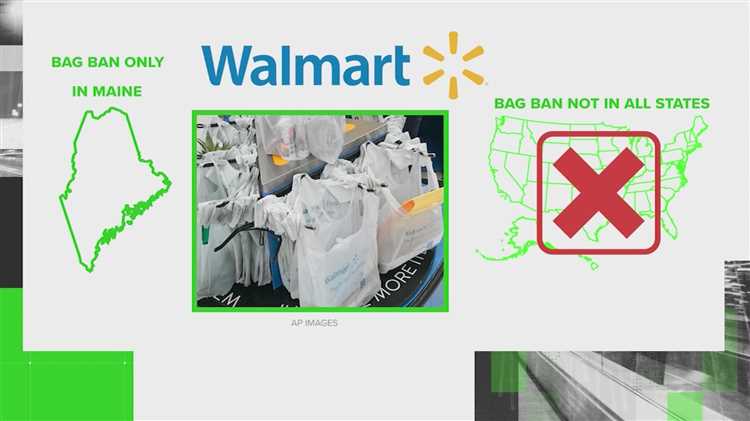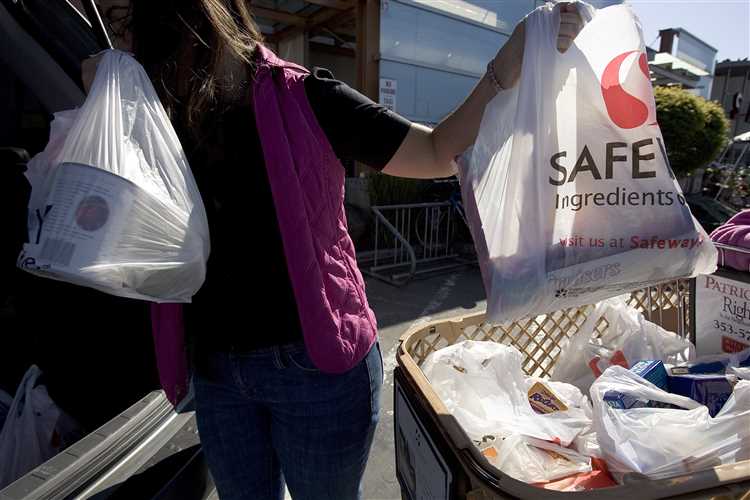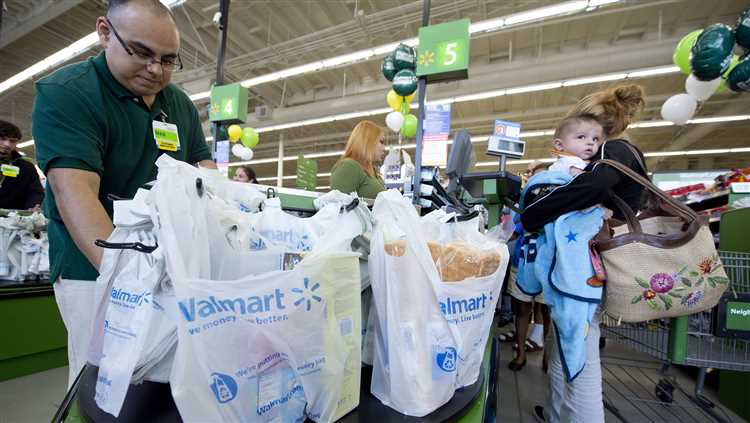
One of the biggest retail chains in the world, Walmart, has recently implemented a new policy that has raised many questions among shoppers. The policy in question is the introduction of a charge for plastic bags at Walmart stores across the country. This move has sparked a debate on whether consumers should be charged for plastic bags, and if so, what the implications might be.
Firstly, it is important to understand the motivation behind the decision to charge for bags. Walmart has stated that the goal of this policy is to encourage customers to bring their own reusable bags, in an effort to reduce the use of single-use plastic bags and promote sustainability. By charging for bags, Walmart aims to create awareness about the environmental impact of plastic waste and nudge consumers towards more eco-friendly alternatives.
However, this change has not been without criticism. Many shoppers argue that the charge for bags is simply an additional cost imposed on consumers, especially those who rely on Walmart for their everyday needs. Some have expressed concerns that this policy may disproportionately affect lower-income individuals who may not have access to reusable bags or cannot afford to pay for plastic bags.
In conclusion, the question of whether Walmart charges for bags is not a simple one. While the introduction of a charge aims to promote sustainability and reduce plastic waste, it also poses potential challenges for some shoppers. As the debate continues, it is important to consider the environmental impact of plastic bags and explore viable solutions that balance sustainability with accessibility and affordability for all consumers.
- Walmart Bag Policy
- Environmental impact of plastic bags
- 1. Pollution
- 2. Wildlife threats
- 3. Resource depletion
- 4. Energy consumption
- 5. Waste management challenges
- Alternatives to plastic bags
- Reusable bags
- Paper bags
- Walmart’s efforts to reduce plastic waste
- Bag charges and incentives
- Promoting reusable bags
- Recycling programs
- Public opinion on Walmart’s bag policy
- Q&A,
- Does Walmart charge for bags?
- How much does Walmart charge for bags?
- Are Walmart bags biodegradable?
- Can I bring my own bags to Walmart?
- What happens if I forget my bags at Walmart?
- How much does Walmart charge for bags?
- Why does Walmart charge for bags?
Walmart Bag Policy
Walmart is committed to reducing plastic waste and promoting environmental sustainability. As part of this effort, Walmart implemented a bag policy to discourage the use of plastic bags.
Starting in 2021, Walmart began charging a small fee for plastic bags at checkout. This fee motivates customers to bring their own reusable bags or opt for paper bags instead. By doing so, Walmart aims to encourage responsible consumer behavior and reduce the impact of plastic bags on the environment.
Walmart offers a variety of alternatives to plastic bags, including reusable bags made from recycled materials. These bags are available for purchase at the checkout area, providing customers with a convenient and eco-friendly option for carrying their purchases.
It’s important to note that some states and localities have implemented their own bag regulations, which may differ from Walmart’s policy. Customers should familiarize themselves with the bag regulations in their area to ensure compliance.
By implementing a bag policy, Walmart is taking an active role in promoting sustainable practices and reducing plastic waste. As a customer, you can contribute to these efforts by bringing your own reusable bags or opting for paper bags when shopping at Walmart.
Remember:
Reducing plastic waste is a collective responsibility, and together, we can make a positive impact on the environment.
Environmental impact of plastic bags

Plastic bags have become a ubiquitous part of our daily lives, but the environmental impact of these convenient carriers is significant. Here are some of the key ways in which plastic bags contribute to environmental degradation:
1. Pollution

Plastic bags are non-biodegradable, which means they do not break down naturally in the environment. Instead, they can persist for hundreds of years, creating long-term pollution. When plastic bags are improperly disposed of, they often end up in water bodies, where they can harm marine life. According to research, over 8 million metric tons of plastic enter the oceans each year, and plastic bags are a significant contributor.
2. Wildlife threats
The presence of plastic bags in the environment poses a direct threat to wildlife. Marine animals, such as turtles and seabirds, can mistake plastic bags for food, leading to choking or intestinal blockages. Additionally, land animals can become entangled in plastic bags, which may cause injury or even death. The sight of animals struggling with plastic waste is a heart-wrenching reminder of the consequences of our excessive plastic bag use.
3. Resource depletion
The production of plastic bags requires significant amounts of natural resources, including oil and gas. Extracting and processing these resources has its own environmental impacts, such as air and water pollution. By reducing our consumption of plastic bags, we can help conserve these valuable resources and minimize the associated environmental damage.
4. Energy consumption
In addition to depleting resources, the production of plastic bags also consumes a considerable amount of energy. From extracting raw materials to manufacturing and transportation, the entire lifecycle of a plastic bag requires energy inputs. By reducing the demand for plastic bags, we can reduce our overall energy consumption and the associated greenhouse gas emissions.
5. Waste management challenges
Plastic bags are one of the most common items found in litter and landfill sites. Their lightweight nature allows them to be easily carried by the wind, contributing to visual pollution in our surroundings. The proper disposal and management of plastic bags require significant resources, further burdening waste management systems. By opting for reusable bags, we can alleviate some of these waste management challenges.
| Issue | Environmental impact |
|---|---|
| Pollution | Long-term pollution, marine ecosystem harm |
| Wildlife threats | Choking, entanglement, and death of marine and land animals |
| Resource depletion | Depletion of oil and gas resources |
| Energy consumption | High energy requirements throughout the lifecycle |
| Waste management challenges | Litter, landfill crowding, and burdened waste systems |
Given these environmental impacts, it is essential that we reconsider our reliance on plastic bags and explore more sustainable alternatives. By using reusable bags, we can significantly reduce our contribution to plastic pollution and help protect the health of our planet.
Alternatives to plastic bags
In an effort to reduce the use of plastic bags, Walmart offers several alternative options for customers. These alternatives are both environmentally friendly and convenient for shoppers.
Reusable bags
One of the most popular alternatives to plastic bags is reusable bags. These bags are made of durable materials such as canvas or nylon, and can be used multiple times. Walmart offers a variety of reusable bags in different sizes and designs, allowing customers to choose the one that best fits their needs.
Paper bags

For those who prefer a disposable option, Walmart also offers paper bags. These bags are made from recycled materials and are biodegradable, making them a more sustainable choice compared to plastic bags. While paper bags are not as durable as reusable bags, they can still be reused multiple times before being recycled.
Walmart encourages customers to bring their own reusable bags by offering incentives such as discounts or rewards. By choosing alternatives to plastic bags, shoppers can contribute to reducing plastic waste and protecting the environment.
| Alternative Option | Description | Pros | Cons |
|---|---|---|---|
| Reusable bags | Durable bags made of canvas or nylon that can be used multiple times. | Environmentally friendly, reduces plastic waste. | Can be bulky to carry around. |
| Paper bags | Disposable bags made from recycled materials that are biodegradable. | Biodegradable, can be recycled after use. | Not as durable as reusable bags. |
Walmart’s efforts to reduce plastic waste
Walmart, one of the largest retail chains in the world, is committed to reducing plastic waste and promoting sustainability. As part of their efforts, Walmart has implemented several initiatives to minimize the use of single-use plastic bags and encourage customers to bring their reusable bags.
Bag charges and incentives
In many Walmart stores, customers are charged a fee for single-use plastic bags at the checkout. This serves as a deterrent to encourage shoppers to bring their own reusable bags. By implementing bag charges, Walmart aims to reduce the consumption of plastic bags and promote environmental consciousness.
Additionally, Walmart has introduced incentives for customers who bring their own bags. These incentives may include discounts or loyalty rewards, further encouraging shoppers to opt for reusable bags instead of plastic ones.
Promoting reusable bags
Walmart actively promotes the use of reusable bags among its customers. They have made an extensive range of reusable bags available for purchase in their stores, offering customers a convenient and eco-friendly alternative to single-use plastic bags.
Furthermore, Walmart raises awareness about the importance of using reusable bags through signage and educational materials displayed throughout their stores. These efforts aim to encourage customers to make environmentally conscious choices and reduce plastic waste.
Recycling programs

In addition to reducing the use of plastic bags, Walmart is committed to recycling plastic waste. They have established recycling programs in their stores, providing drop-off locations for customers to dispose of their plastic bags and other plastic packaging materials. Through these programs, Walmart aims to divert plastic waste from landfills and promote recycling as a sustainable solution.
| Initiative | Description |
|---|---|
| Bag charges | Customers are charged a fee for single-use plastic bags at checkout |
| Incentives | Discounts or rewards are offered to customers who bring their own bags |
| Reusable bags | A wide range of reusable bags are available for purchase in stores |
| Raising awareness | Signage and educational materials are displayed to promote reusable bags |
| Recycling programs | Drop-off locations are provided for customers to recycle plastic bags and packaging materials |
Public opinion on Walmart’s bag policy
Walmart’s bag policy has been a topic of discussion and debate among the public. While some people appreciate the efforts made by Walmart to reduce plastic waste and promote sustainability, others have expressed their concerns and dissatisfaction with the policy.
Advocates for Walmart’s bag policy argue that it is a positive step towards protecting the environment. They believe that by charging for bags, Walmart is encouraging customers to bring their reusable bags or opt for alternative options like paper bags. These individuals believe that reducing the use of single-use plastic bags can have a significant impact on reducing pollution and waste.
On the other hand, critics of the bag policy argue that it places an unnecessary burden on customers. Some people feel that Walmart, being a large corporation, should absorb the cost of providing bags instead of passing it on to the customers. Additionally, some individuals believe that Walmart’s motive behind the bag policy is purely profit-driven rather than genuinely caring for the environment.
There are also concerns about the impact of the bag policy on low-income individuals and families. Some argue that the additional cost of purchasing bags may be a financial burden for those who are already struggling to make ends meet. They suggest that Walmart should explore alternative ways to promote sustainability without negatively impacting its customers.
Public opinion on Walmart’s bag policy is divided, with contrasting viewpoints regarding its effectiveness and potential drawbacks. While some people appreciate the efforts made by Walmart to reduce plastic waste, others have raised concerns about the policy’s impact on customers, particularly those who are economically disadvantaged.
Q&A,
Does Walmart charge for bags?
Yes, Walmart does charge for bags. They implemented a reusable bag policy in many of their stores where customers are encouraged to bring their own bags. If customers forget their bags, they can purchase reusable bags for a small fee.
How much does Walmart charge for bags?
The cost of bags at Walmart can vary depending on the location and the type of bag. On average, reusable bags at Walmart cost around $0.99 to $1.99 each.
Are Walmart bags biodegradable?
No, Walmart bags are not biodegradable. Most of the bags provided by Walmart are made from recyclable materials such as plastic or paper, but they can take hundreds of years to decompose in the environment.
Can I bring my own bags to Walmart?
Yes, you can bring your own bags to Walmart. In fact, Walmart encourages customers to bring their own reusable bags as part of their sustainability efforts. By bringing your own bags, you can help reduce the use of single-use plastic bags and decrease waste.
What happens if I forget my bags at Walmart?
If you forget your bags at Walmart, you have the option to purchase reusable bags at the store. The cost of these bags can vary, but it is typically a small fee. Alternatively, you can choose to carry your items without a bag or use any available boxes or containers provided by the store.
How much does Walmart charge for bags?
Walmart charges 5 cents for a plastic or paper bag at checkout. This charge is to encourage customers to bring their own reusable bags and reduce plastic waste.
Why does Walmart charge for bags?
Walmart charges for bags as part of their sustainability initiative. The fee is meant to encourage customers to bring their own reusable bags and reduce the use of plastic bags, which helps to reduce waste and environmental impact.